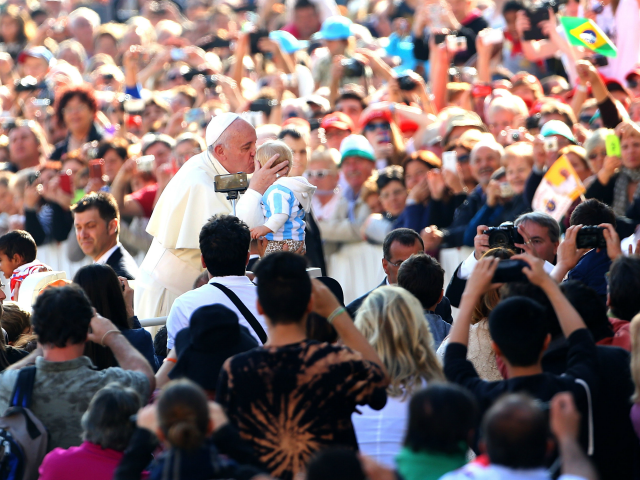

ROME — Pope Francis has proclaimed 2021 as a year dedicated to the family, urging greater study of the “ideal of conjugal and family love.”
In his Angelus address Sunday — as the Catholic Church celebrated the feast of the Holy Family of Jesus, Mary, and Joseph — the pope announced the upcoming year on the family would begin March 19, the feast of Saint Joseph and the fifth anniversary of the publication of his teaching letter Amoris Laetitia (“The Joy of Love”).
“It is good to reflect on the fact that the Son of God wanted to be in need of the warmth of a family, like all children,” the pontiff said Sunday. “Precisely for this reason, because it is Jesus’ family, the family of Nazareth is the model family, in which all families of the world can find their sure point of reference and sure inspiration.”
“In imitation of the Holy Family, we are called to rediscover the educational value of the family unit: it must be founded on the love that always regenerates relationships, opening up horizons of hope,” he said.
The pope said that the coming year will be “a year of reflection on Amoris laetitia and it will be an opportunity to focus more closely on the contents of the document.”
That letter — called an “apostolic exhortation” in Vatican-speak — provoked consternation in the LGBT lobby, as Francis forcefully reaffirmed the essential nature of marriage as between one man and one woman.
In the text, Francis wrote that “only the exclusive and indissoluble union between a man and a woman has a plenary role to play in society” and that de facto or same-sex unions may not “be equated with marriage.”
“No union that is temporary or closed to the transmission of life can ensure the future of society,” he said.
In his letter, the pope also offered an extended reflection on the unique value of motherhood and fatherhood, neither of which is dispensable or replaceable with a unisex version of “parent.”
“Every child has a right to receive love from a mother and a father,” he wrote, and “both are necessary for a child’s integral and harmonious development.”
Many countries “are witnessing a legal deconstruction of the family,” he said, and this cannot bode well for the future of society. It is unacceptable that “international bodies should make financial aid to poor countries dependent on the introduction of laws to establish ‘marriage’ between persons of the same sex.”
In the letter, Francis also denounced an ideology of gender that “denies the difference and reciprocity in nature of a man and a woman and envisages a society without sexual differences, thereby eliminating the anthropological basis of the family.”
“An appreciation of our body as male or female,” he said, is “necessary for our own self-awareness in an encounter with others different from ourselves.”
An effort to cancel out sexual differences based in anatomy is a symptom of a society that “no longer knows how to deal with it,” he wrote.
Rejecting politically correct redefinitions of family, Francis said that the Christian vision of marriage is essential for the future of the world.
“As Christians, we can hardly stop advocating marriage simply to avoid countering contemporary sensibilities, or out of a desire to be fashionable or a sense of helplessness in the face of human and moral failings,” he said.
“The Church has always held it part of her mission to promote marriage and the family and to defend them against those who attack them,” he said.
Francis also issued a sharp rebuke to the abortion industry, calling it a “horrendous contradiction” when the family itself becomes a place where life is rejected and destroyed.
“So great is the value of a human life, and so inalienable the right to life of an innocent child growing in the mother’s womb, that no alleged right to one’s own body can justify a decision to terminate that life,” he said.
“How can we issue solemn declarations on human rights and the rights of children, if we then punish children for the errors of adults?” he said.
Proponents of school choice found welcome support in the papal text, which declared that the education of children is a “primary right” of parents.
Education of children is “an essential and inalienable right that parents are called to defend and of which no one may claim to deprive them,” Francis said. Whereas the State offers educational programs in a “subsidiary way,” supporting the parents in their fundamental role, it is parents themselves who “enjoy the right to choose freely the kind of education” they wish to give their children in accordance with their convictions, he declared.
“Schools do not replace parents, but complement them,” he wrote. Because of this, “all other participants in the process of education are only able to carry out their responsibilities in the name of the parents, with their consent and, to a certain degree, with their authorization.”
Related posts:
Views: 0
 RSS Feed
RSS Feed

















 December 28th, 2020
December 28th, 2020  Awake Goy
Awake Goy  Posted in
Posted in  Tags:
Tags: 
















